1st year subject
One year to deepen understanding by learning the basic knowledge to get a job related to animals.
Learn more about yourself and your dreams by learning about the animal industry and animal professionals.
Classes in the first year are lectures and practical training common to all departments. In order to build the basic skills to work in the animal industry, you will learn a wide range of animal diseases, body structure, psychology (behavior), beauty, nutrition, breeding, cleaning, and acquire basic knowledge. Also, through the breeding of school animals, it is a year in which you can learn a lot from the relationships with animals, such as breeding management, nutritional management, and daily cleaning.
In addition, we are conducting overseas training to broaden our knowledge.
Class outline
Lecture that makes you want to know more about animals
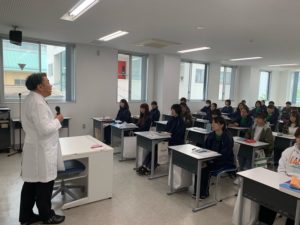 Regardless of the department, first graders will study common subjects necessary for getting a profession dealing with animals and deepen their understanding of basic knowledge. This is also a valuable point in choosing a department when advancing to the second grade.
Regardless of the department, first graders will study common subjects necessary for getting a profession dealing with animals and deepen their understanding of basic knowledge. This is also a valuable point in choosing a department when advancing to the second grade.
In order to acquire basic skills in the first year, we will learn a wide range of things such as animal diseases, body structure, psychology and nutrition, breeding management methods and cleaning methods.
Lecture common to all departments to deepen basic knowledge of animals
Learn knowledge and communication
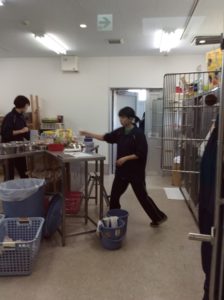 Animals do not say anything from themselves unless humans notice them. Also, animals cannot explain their physical symptoms to humans and cannot complain of pain in human language. That is why it is so important to acquire basic knowledge not only about cuteness but also about animals.
Animals do not say anything from themselves unless humans notice them. Also, animals cannot explain their physical symptoms to humans and cannot complain of pain in human language. That is why it is so important to acquire basic knowledge not only about cuteness but also about animals.
In addition, it is one of the important learnings to create a rich human being through communication between people. By cooperating with each other and taking care of the school animals, you can learn compassionate behavior from the standpoint of the other party. Through these activities, you can grow into a person who can understand the importance of keeping the lives of important pets and the feelings of pet owners in the future.
 Learn about animals and the animal industry
Learn about animals and the animal industry
 Learn communication skills
Learn communication skills
 Learn about illness at a veterinary clinic
Learn about illness at a veterinary clinic
1st year curriculum
Animal breeding management
Since many animals are bred in the academy, we will conduct clinical tests, blood and stool tests, discipline and training on these animals, and learn about the health condition and ecology of animals through the practice of breeding management. In addition, you will become familiar with the handling of animals in general by touching the animals raised at school.
Clinical laboratory studies
Learn about animal stool, urine, blood, cell sample tests and X-rays (basic properties of radiation, protection, mechanism and management of generators), ECG, ultrasound, endoscopy, MRI, and CT features.
Dog and cat studies
You will learn about the history of dogs since they were domesticated, the relationship between dogs and humans that appeared in faith, literature, art, etc., various characteristics and behaviors of dogs, and the role of dogs. You will also learn about the history of cats and their relationship with humans, as well as cat classification, characteristics, breeding, discipline, and health care. In addition, you will learn about the main illnesses, health and nutritional management of dogs and cats.
Clinical laboratory training I
Specimen processing (processing method, storage) Handling of testing equipment (microscope, various testing equipment) Blood test, urine test, stool test, cytology, microbiological test (immunological test, microscopic test, specimen preparation, normal Learn about the difference between and abnormalities, cross-match, culture) roentgen, ultrasound, ECG, etc. (protection, handling, preparation, etc.).
English conversation / overseas training
Overseas training observes advanced knowledge and technology overseas, and promotes understanding of future trends from among them. You can also learn about animal conservation status, facility structure, operation and attitudes, and select it as the theme for your graduation thesis.
In order to make effective use of the opportunity of overseas training, you will learn English conversation assuming communication with foreigners.
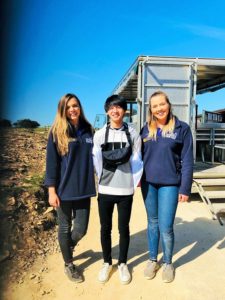
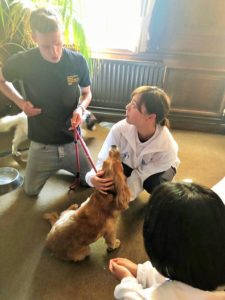
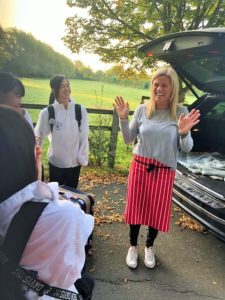
Ethology
Mainly learn about cynology / cat studies, significance and mechanism of behavior, discipline / training, and problem behavior.
Contents:
Domestication of animals
Outbreaks of dogs and cats
Ecology
Kind characteristics
Behavioral development process
Behavioral periodicity (endocrine, hormones)
Innate and habitual behavior
Learning theory
Motivation
Socialization
excretion
Calming signal
Puppy class
Excretion behavior
Aggression
Fear / anxiety
Trimming theory
You will learn from shampoo to cutting, understand the technique of emphasizing the characteristics of each breed, and acquire practical skills through practical training. Learn to identify the strengths and weaknesses of dogs and cats and maximize their individual appeal.
Pet aroma massage
Learn about massage methods to relax animals that are under-exercised or stressed. This includes aromatherapy using essential oils, and we will support the acquisition of an aroma coordinator license.
Liberal arts course
We invite experts from various fields to give lectures and lectures, giving students the opportunity to think about society, work, and animals.
Pet animal breeding
Based on the “Act on Welfare and Management of Animals”, we will prepare for the acquisition of qualifications with the aim of becoming a pet animal breeding manager necessary for disseminating and instructing knowledge on animal protection and proper breeding management.
Animal welfare theory
Mainly learn about veterinary medical ethics and animal welfare, especially bioethics, informed consent, euthanasia, and five freedoms.
Introduction to Nursing
Based on helping animals to lead a healthy daily life, you will learn about the history of animal medicine, experimental animals, history of drug research, animal welfare, and how to handle animals from the viewpoint of human nursing.
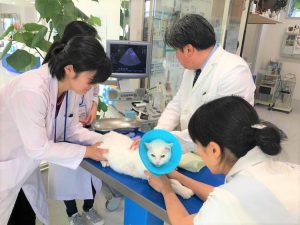
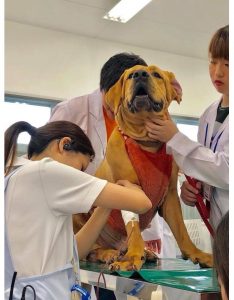
Dentistry I
As small animal dentistry in animal nursing has become more and more important in recent years, pet owners need to ask about oral hygiene and teach home care methods, so in Dental Science I, the structure and function of the oral cavity. Understand the basic knowledge about dental prevention methods and learn the basics of oral care for domestic animals.
Nutrition
Understand energy sources, composition of living organisms, regulation of biological functions, etc., and learn about changes in the absorption process of nutrients. You will also deepen your understanding of nutrient-containing diets and how to feed them.
Public Health / Ethics and Law
Learn about the problems of human-animal interrelated illnesses. We will also deepen our understanding of prevention and countermeasures for zoonotic diseases, securing safe food, maintaining the living environment of humans and animals, mutual relations between humans and animals, and hygiene administration. You will also learn basic ethical issues and laws such as animal welfare activities and troubleshooting human and animal problems.
Anatomical physiology
Understand the mechanism and function of the animals’ bodies, and learn about the skeleton, muscles, nerves, etc. Living organisms made up of cells have different morphologies and functions depending on the site. We will deepen our understanding of various physiological and regulatory functions of the living body such as organs where cells are gathered, or their linked organs, strains, blood, and hormones.
Pathology / Infectious Diseases
Learn about the types of pathogenic bacteria that cause illness, how to treat and prevent illness. Learn about the relationship between public facilities, homes, outdoor sanitary animals and domestic animals, and disinfection of animal equipment. You will also learn about the physiological, cellular and histological changes in the body that occur during illness.
Nursing practice I
You will practice in the academy and at a veterinary hospital, experience what you have learned about veterinary medicine, and deepen your knowledge and experience about illness and prevention.
